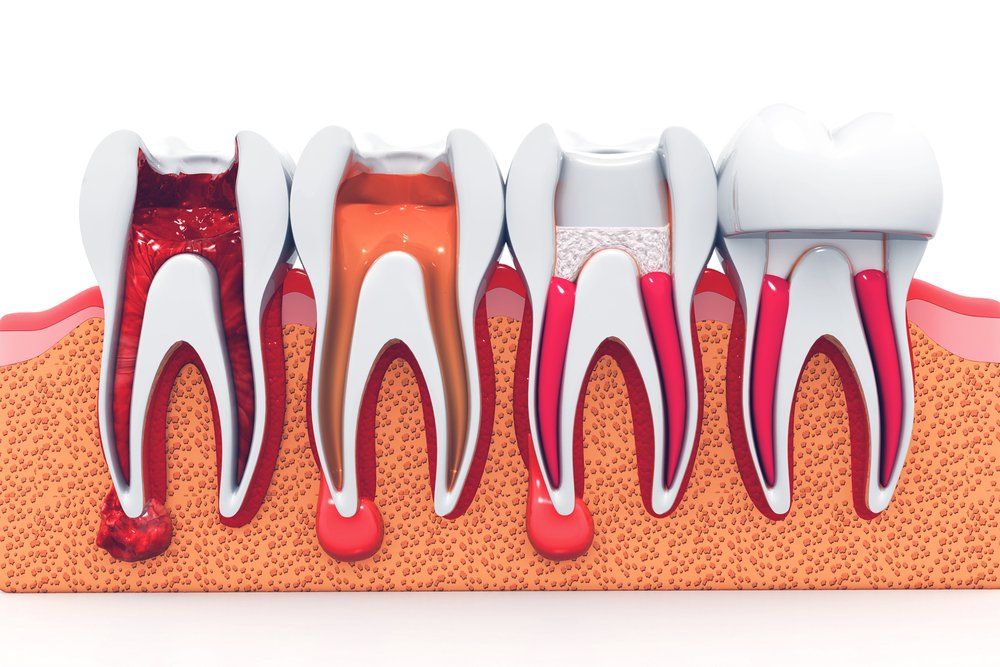Healthier Teeth at the Root: How Endodontics Can Save Your Teeth

Tooth pain affects your entire life. Severe tooth pain can change the way you eat, how you speak, your mood, and your ability to carry on throughout the day. This type of tooth pain often calls for a dental specialist in the field of endodontics. They diagnose and treat the cause of severe tooth pain. As their goal is to save your natural tooth, they get to the root of the problem - the root of your tooth that is.
Endodontists work in a branch of dentistry that focuses on dental pulp and tissues surrounding the root of a tooth. Exactly how did this field come to be labeled as endodontics? Well, its genesis stems from Greece, as "endo" is the Greek term for "inside" and "odont" translates to "tooth". These specialists perform both routine and more complex endodontic procedures, such as root canal treatment, endodontic surgery, and special procedures that preserve teeth after traumatic dental injuries. Committing their practice to these specific procedures, an endodontist is entrusted to manage a vast array of concerns with great efficiency. With advanced technologies and specialized techniques, they are given astounding access to the inside of the tooth, which allows them to provide timely, comfortable treatment. Saving the day by halting decay, an endodontist strives to keep your tooth fully intact.
Types Of Endodontic Treatment

Root Canal Procedure
When your pulp, the soft tissue inside the root canal, becomes inflamed or infected, root canal treatment is necessary. Extensive decay, repeated dental procedures on the tooth, a faulty crown, and a crack or chip in the tooth can all be reasons for you to schedule a root canal procedure. A tooth with no visible chips or cracks can still experience an injury that harms pulp and, left untreated, inflammation or infection can cause discomfort or lead to an abscess. Some symptoms are indicative that a root canal is required: severe pain while chewing or biting, pimples on the gums, lingering sensitivity to hot or cold foods, swollen or tender gums, and deep decay or darkening of the gums. Your endodontist removes the inflamed or infected pulp, carefully cleans and shapes the inside of the root canal, then fills and seals the space. Following this process, you will return to your dentist and have a crown, or other restoration, placed on the tooth to protect and restore it to complete function. Now, the tooth will function like any other.
Endodontic Retreatment
Teeth that have undergone a root canal procedure can heal irregularly and, as a result, become painful or diseased months, even years, after treatment. In this scenario, there is a second opportunity to salvage the tooth with retreatment, an additional procedure that could potentially diminish dental pain and contribute to healing. Your tooth's healing process after the initial treatment might have been negatively affected due to a few reasons: narrow or curved canals were not treated during the first procedure; complicated canal anatomy went undetected; the placement of the crown or other restoration was postponed following the endodontic treatment, or the restoration did not successfully prevent salivary contamination to the inside of the tooth. Also, a new issue can potentially jeopardize a tooth that was sufficiently treated, including new decay exposing the root canal material to bacteria that creates an infection within the tooth; a loose, cracked, or broken crown or filling exposing the tooth to a new infection, and a tooth sustaining a fracture. Retreatment consists of your endodontist re-opening your tooth and removing the filling materials that were placed in the root canals during the first procedure. Once your endodontist takes a measured approach in evaluating the tooth, spotting additional canals, or new infection, they will proceed to remove any infection, clean and shape the canals, and place new filling materials. Having sealed the opening with a temporary filling, your endodontist will allow the tooth to heal before a new crown or other restoration is placed on the tooth for protection purposes.
Endodontic Surgery
If a non-surgical root canal procedure cannot save your tooth, your endodontist might suggest surgery because it can locate small fractures or hidden canals that X-rays were unable to detect throughout the initial treatment. Additionally, surgery can be recommended to remove calcium deposits in root canals or treat impacted root surfaces and the surrounding bone of the tooth. Many surgical procedures are available for the preservation of teeth, but an apicoectomy is the most common, a possible resolution for inflammation or an infection that continues in the bony area around your tooth in the aftermath of a root canal procedure. With this microsurgical procedure, your endodontist will apply local anesthesia to ensure you are comfortable, then open the gum tissue near the tooth to examine the underlying bone and remove any inflamed or infected tissue. The very end of the root is removed as well. To seal the end of the root canal, a small tissue may be placed, along with a few stitches or sutures that assist the tissue in its healing. Within the next few months, the bone will heal around the end of the root and the majority of patients can resume normal activities the next day.
How To Protect Your Roots

Receding gums are often the consequence of plaque accumulation, improper brushing, or the catastrophic use of tobacco products. There are a few steps, capable of protecting your roots and reducing your likelihood of seeing them exposed, that you can implement into your oral routine:
- Regular Dental Checkups: by visiting your dentist consistently, you give them a better chance of identifying any signs of gum disease or recession.
- Tobacco Is A No-No: over 40 percent of patients between the ages of 20 to 64 who smoke cigarettes have untreated gum disease, a figure which doubles that of patients who have never smoked. Although quitting can be challenging, speak to your healthcare provider about a cessation plan that suits you.
- Brush & Floss Your Teeth: it is worth repeating that brushing twice and flossing once per day is an indispensable service that you are offering for your overall oral health, roots included. As you brush, avoid aggressively pushing on your teeth or using an overly hard brush because it will only hurt your gums and expose the roots of your teeth.
- Avoid Teeth Grinding: grinding your teeth can produce the type of pressure that eventually causes gum recession, so wear a mouthguard if this is the case during your sleeping hours.

Endodontists are dental specialists who are dedicated to resolving tooth aches that disrupt your daily life. They determine the complex causes of the pain and create a treatment plan based on your oral health. The most common treatment an endodontist preforms is a root canal, which repairs the tissue inside of your tooth. Typically, most patients will not need to see an endodontist if they have an established oral care routine that includes: brushing twice a day, flossing, using mouth wash, and seeing our dentists every 4-6 months for preventative care.
If you are regularly experiencing tooth or mouth pain, consult with our dentists at your earliest convenience.




